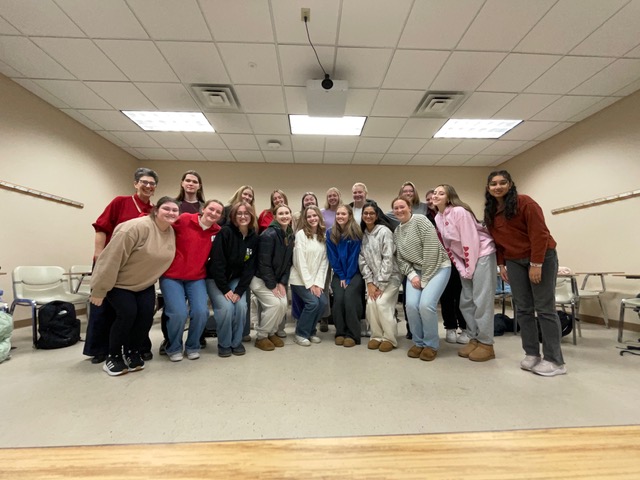A cohort of 20 first-year UW–Madison students across majors learned about language and the human experience through a first-year interest group anchored by a small-enrollment seminar taught by Rubinstein Professor of Psychology Jenny Saffran last fall.
As part of the first-year interest group (FIG) program, a cohort of 20 students completed a main seminar course in Psychology, “Language and the Human Experience,” and two other courses, Biological Anthropology and Linguistics, together as a cohort. The FIG was one of more than 60 different FIGs on various subjects offered exclusively to incoming first-year students across the university each fall.

Gabriela Wolf, a student in the FIG this fall, decided to enroll after growing up in a bilingual home and enjoying foreign language classes in grade school and high school. The opportunity to learn how children become fluent in multiple languages interested her. The small class size of the seminar and the two other courses students took together facilitated whole-class and small-group discussions that helped ease her transition to college.
“Speech and language are present in human life every day, but I did not know much about how humans undergo language acquisition,” Wolf says. “After taking part in Dr. Saffran’s class that dove deep into the process of language learning and making interdisciplinary connections with the other FIG classes, Biological Anthropology and Linguistics, I hope to continue exploring similar topics in my undergrad and beyond.”
Zoey Westen, who plans to double major in Neurobiology and Spanish, enrolled in the FIG with an interest in learning about the biological and psychological aspects of language. The main seminar introduced her to the topic of infant language learning, which has since sparked her interest in learning more about how our brains anatomically adapt for language learning.
“Dr. Saffran made the classroom an extremely welcoming environment,” Westen says. “This allowed my peers and me to constantly engage in discussion during her class, which made the class much more than a lecture. This also allowed us to learn different perspectives or ideas that our peers had. This class was extremely meaningful to me, and I have become close friends with my classmates. I know that I can always count on my classmates and Dr. Saffran’s support. This made my transition to college a lot easier, knowing I had a support system.”
Launched in 2001, the FIGs program has engaged thousands of students as they begin their college journeys. This summer, incoming students will be able to register for one of nearly 70 FIGs, including Childhood Challenges: How Psychology Helps, led by Professor Kristin Shutts.